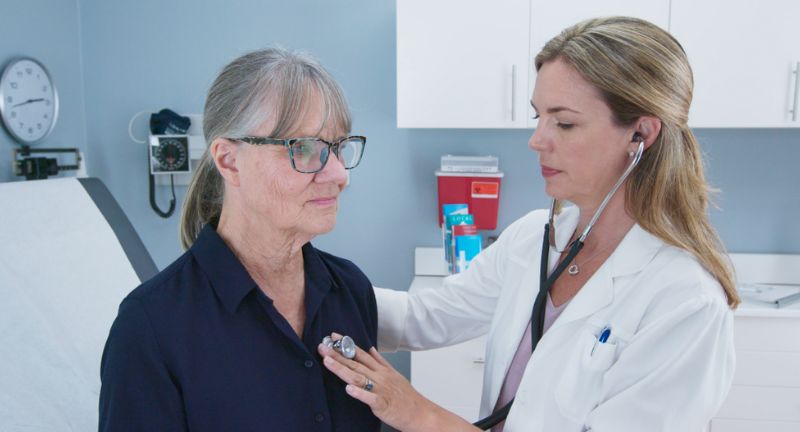Health
Cancer Symptoms That Shouldn’t Be Ignored In Women And Men
Published
11 months agoon

Shutterstock
Cancer is a disease that can often present itself in subtle, easily overlooked ways, leading to delays in diagnosis and treatment. Despite advancements in medical science and increased awareness, many symptoms of cancer still go unnoticed or are misinterpreted. These symptoms, which can vary between men and women, are frequently ignored because they can resemble those of less serious conditions or everyday health issues. This common oversight underscores the importance of understanding and recognizing the early signs of cancer, as early detection significantly improves treatment outcomes and survival rates.
Breast Changes

iStock
Breast changes, including lumps, nipple discharge, and changes in skin texture or asymmetry, are potential indicators of breast cancer. While many breast lumps are benign, it’s crucial to have them checked, especially if they are hard, irregularly shaped, and immovable. Breast cancer also occurs in men, though less commonly, and presents similar symptoms. Changes such as nipple retraction, skin dimpling, and redness require immediate medical evaluation for early detection and treatment.
Difficulty Swallowing

iStock
Difficulty swallowing, or dysphagia, often starting as a sensation of food being stuck in the throat, can indicate cancers of the throat, esophagus, or stomach. This symptom can lead to weight loss and nutritional deficiencies if eating becomes difficult. It is sometimes attributed to less serious conditions like a sore throat or reflux, but if persistent, it should be investigated through diagnostic procedures like a barium swallow or endoscopy to rule out cancer.
Unexplained Fever

iStock
Fever without an apparent cause, especially recurrent or predominantly nocturnal, can be an early sign of cancer. Cancers such as lymphoma and leukemia often present with fever as the immune system reacts to the presence of cancer cells. These fevers can be mistaken for infections, but if persistent and unexplained, they require medical investigation to rule out underlying malignancies.
Unusual Bruising

Shutterstock
Excessive or unexpected bruising, especially in unusual areas like the back or hands, can be a symptom of blood cancers like leukemia. These cancers can disrupt the body’s normal clotting process, leading to easier bruising. If accompanied by frequent nosebleeds or bleeding gums, it’s critical to seek a medical evaluation as these could be signs of a serious underlying condition.
Oral Changes

iStock
Persistent sores, lesions, white patches, or numbness in the mouth are warning signs of oral cancer, particularly in tobacco users. These changes can be easily overlooked but if they do not heal within two weeks, they need to be evaluated by a healthcare professional. Regular dental check-ups play a crucial role in identifying these early signs of cancer, leading to better outcomes through early treatment.
Skin Changes

iStock
Alterations in moles or birthmarks, such as changes in shape, color, size, or texture, are important indicators of skin cancer, including melanoma. Regular self-examinations are vital, and any suspicious changes should be professionally evaluated. Dermatologists use specialized tools to assess skin lesions, and early detection can significantly improve treatment success.
Abnormal Periods or Pelvic Pain

iStock
In women, persistent changes in menstrual cycles or unusual pelvic pain can signal reproductive cancers like cervical, uterine, or ovarian cancer. These symptoms are often mistaken for normal menstrual irregularities or benign conditions. Regular monitoring and reporting of any significant changes or persistent pain to a healthcare provider are crucial. Diagnostic tests like pelvic exams and ultrasounds may be necessary to investigate these symptoms.
Changes in Bathroom Habits

iStock
Significant and persistent changes in bowel or bladder function, such as constipation, diarrhea, changes in stool caliber, urinary frequency, or blood in urine, should not be ignored. These symptoms could indicate colon, prostate, or bladder cancer. They are often attributed to less serious conditions but warrant a medical evaluation, especially with a family history of cancer. Diagnostic tests like colonoscopies and urinalysis can be critical in early detection.
Unexplained Weight Loss

iStock
Weight loss without trying, especially if significant and rapid, can be an indicator of various cancers, such as esophageal, pancreatic, liver, and colon cancers, as well as leukemia and lymphoma. This symptom is often welcomed or ignored, but if unexplained, it requires medical attention. Regular monitoring of weight and consulting with a healthcare provider if there’s an unexplained decrease is crucial for early detection and treatment.
Persistent Fatigue

iStock
Severe and continuous tiredness, not relieved by rest, could be a warning sign of various cancers disrupting normal energy utilization or production. This fatigue is often dismissed as a common part of busy life or aging, but if it’s persistent and severe, it warrants a medical evaluation. Accompanying symptoms like weight loss or night sweats increase the urgency for a check-up. Blood tests can be instrumental in identifying underlying causes, including anemia or metabolic disturbances.
Blood in the Stool

iStock
Blood in the stool, particularly if it’s bright red or very dark, should always be taken seriously. While often related to benign conditions like hemorrhoids, it can be an early sign of colon cancer. Awareness and appropriate screening, particularly in individuals over 50 or with a family history of colon cancer, are essential. A colonoscopy is a key diagnostic tool for early detection and treatment of colon cancer.
Unusual Bleeding or Discharge

iStock
Unusual vaginal bleeding or discharge in women can be symptoms of cervical, uterine, or ovarian cancers. Postmenopausal bleeding is particularly concerning. Regular gynecological exams and reporting any unusual symptoms are crucial for early detection. Pap smears and HPV tests are important screening tools for cervical cancer.
Chronic Hoarseness

iStock
Persistent hoarseness or changes in the voice can indicate laryngeal (voice box) cancer or lung cancer. It’s important for individuals, especially smokers and heavy drinkers, to be vigilant about this symptom. If hoarseness persists for more than two weeks, particularly without a cold or flu, a medical evaluation is necessary. Laryngoscopy can be used to examine the throat and voice box for signs of cancer.
Persistent Pain

iStock
Continuous, unexplained pain anywhere in the body can be an early sign of cancer. This pain can result from a tumor pressing on bones, nerves, or other organs. Tracking the pain’s location, intensity, and duration is important, as well as discussing it with a healthcare provider. Imaging tests like X-rays, CT scans, or MRIs can help in diagnosing the cause of the pain.
Night Sweats

iStock
Profuse sweating at night can be an early symptom of cancers like lymphoma and leukemia. Night sweats can be intense enough to soak bedclothes and are often dismissed as menopausal symptoms or infections. However, if they are persistent, a medical evaluation is necessary. Blood tests and physical examinations can help diagnose the underlying cause.
Shortness of Breath

iStock
Persistent shortness of breath, especially if it worsens or is accompanied by a chronic cough or chest pain, can be a sign of lung cancer. Often misattributed to aging or fitness levels, it’s important to consider a medical evaluation. Pulmonary function tests and imaging studies like chest X-rays or CT scans can aid in diagnosis.
Swollen Lymph Nodes

iStock
Lymph nodes that are persistently swollen and painless, especially in the neck, armpits, or groin, can indicate lymphoma. While infections commonly cause swollen lymph nodes, persistent enlargement over weeks should be evaluated. A biopsy of the lymph nodes can be performed to diagnose the cause.
Persistent Indigestion or Discomfort

iStock
Chronic indigestion or discomfort in the upper abdomen can indicate stomach, throat, or esophageal cancer. These symptoms are often mistaken for heartburn, GERD, or an ulcer. Endoscopic examinations can be useful in diagnosing these types of cancers and should not be delayed if symptoms persist.
Changes in Nails

iStock
Unusual changes in the nails, such as dark streaks, white streaks, or significant alterations in shape, can be signs of skin cancer, including melanoma under the nails. Regular examinations by a dermatologist are important for dermatological assessments and early detection of such cancers.
Unexplained Anemia

iStock
Anemia, especially when it’s not caused by dietary factors, can be a symptom of internal bleeding associated with cancers like colon or gastrointestinal cancer. Symptoms include fatigue, weakness, and pale skin. Blood tests can detect anemia, and further investigations like colonoscopies can determine if cancer is the underlying cause. Anemia can also be a symptom of chronic disease, including cancer, where the body’s resources are depleted.
Difficulty in Urination

iStock
Difficulty starting urination, weak stream, or frequent urination, especially at night, can indicate prostate or bladder cancer in men. Often mistaken for benign prostate enlargement or urinary infections, if these symptoms are accompanied by pain or blood in the urine, they require immediate medical attention. Diagnostic tests such as prostate exams, ultrasounds, or urinalysis can help determine the cause.
Change in Appetite

iStock
A sudden decrease in appetite or change in eating habits can signify various cancers, including stomach, pancreatic, or colon cancer. This symptom can be easily overlooked, especially in older adults. If accompanied by other symptoms like weight loss or abdominal pain, it’s important to consult a healthcare provider. Diagnostic tests such as blood work, abdominal imaging, or endoscopy can help identify the cause of these changes.
Conclusion

iStock
The awareness of these 25 commonly ignored cancer symptoms in women and men is crucial for early detection and effective treatment. While each symptom on its own may not be cause for alarm, the persistence or combination of these symptoms should prompt a consultation with a healthcare provider. It’s essential to remember that these symptoms can also be indicative of other, less serious conditions. However, early and accurate diagnosis plays a key role in improving the outcomes of cancer treatment. Regular health check-ups and screenings, along with a heightened awareness of these symptoms, can significantly aid in the early detection of cancer, offering a better chance for successful treatment and recovery. As always, for any health concerns or symptoms, it’s advisable to seek the advice of a medical professional.












